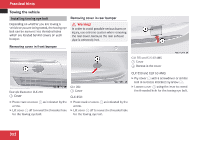2009 Mercedes CLK-Class Owner's Manual - Page 349
2009 Mercedes CLK-Class Manual
Page 349 highlights
Practical hints Battery G Warning! In emergency mode, your vehicle's driving characteristics are diminished in such situations as: Rdriving around curves Rwhile braking Rwhile accelerating rapidly Therefore, your driving style must be adapted accordingly. Avoid abrupt steering and driving maneuvers, as well as driving over obstacles (road curbs, potholes, or offroad areas). This is especially important if the vehicle is heavily loaded. The emergency driving distance that can be achieved greatly depends on the demands placed on the vehicle. Depending on speed, load, driving maneuvers, road conditions, outside temperature, etc., the distance can be significantly shorter or, if the vehicle is driven cautiously, somewhat longer. Do not continue driving in emergency mode if Ryou notice knocking sounds Rthe vehicle starts to shake Rsmoke develops and you smell rubber RESP® Ryou is intervening continuously Battery Safety notes A battery should always be sufficiently charged in order to achieve its rated service life. Refer to Maintenance Booklet for battery maintenance intervals. If you use your vehicle mostly for shortdistance trips, you will need to have the battery charge checked more frequently. When replacing a battery, always use a battery approved by Mercedes-Benz. If you do not intend to operate your vehicle for an extended period of time, contact an authorized Mercedes-Benz Center about steps you need to observe. notice tears on the tire sidewalls After driving in emergency mode, you must have the rims inspected by an authorized Mercedes-Benz Center to check if they are suitable for further use. The failed tire must be replaced in any case. When replacing individual or all tires on the vehicle, make sure only tires marked with "MOExtended" are mounted in the size specified for your vehicle (Y page 365). G Warning! Observe all safety instructions and precautions when handling automotive batteries. Risk of explosion. Fire, open flames and smoking are prohibited when handling batteries. Avoid creating sparks. Z 347
















